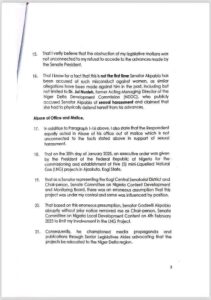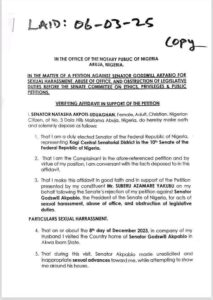
Senator Natasha Akpoti-Uduaghan Releases Explosive Evidence Against Senate President Godswill Akpabio
Senator Natasha Akpoti-Uduaghan Releases a clear Evidence Against Senate President Godswill Akpabio
Breaking: Senator Natasha Akpoti-Uduaghan (PDP, Kogi Central) has submitted a sworn affidavit and documentary evidence to the Senate Ethics Committee, formally accusing Senate President Godswill Akpabio of sexual harassment in a case that threatens to shake Nigeria’s political establishment.

The Allegations: Detailed Account of Harassment Claims
In her formal petition to the Senate Ethics Committee, Senator Akpoti-Uduaghan presents a disturbing pattern of alleged misconduct by the Senate President:




Key Evidence Presented:
- Sworn Affidavit: A notarized legal document detailing specific incidents of harassment
- Digital Communications: Screenshots of alleged inappropriate messages and call logs
- Witness Statements: Accounts from legislative aides and staff members
- Timeline Documentation: Records showing alleged retaliation after rejection of advances
- Prior Complaint Records: Evidence of previous internal reports made before going public
The senator claims the harassment created a hostile work environment that affected her ability to perform her legislative duties effectively. She alleges the misconduct occurred both within the National Assembly complex and at official functions.
Akpabio’s Response: Firm Denial and Counterclaims
Senate President Godswill Akpabio has categorically denied all allegations through his media office:
- Characterized the claims as “politically motivated character assassination”
- Asserted all interactions with Senator Akpoti-Uduaghan were strictly professional
- Suggested the timing coincides with ongoing political tensions in the Senate
- Vowed to pursue legal action against what he calls “defamatory statements”

Political and Public Reactions
Women’s Rights Organizations
Women advocacy groups including WARDC and NAWOJ have demanded an impartial investigation, calling this a watershed moment for addressing gender-based harassment in Nigerian politics.
Political Analysts
Some analysts suggest this case could expose deeper power dynamics in the National Assembly, while others question the timing amid ongoing political realignments.
Public Sentiment
Social media reactions show deep polarization, with #IStandWithNatasha and #AkpabioInnocent both trending nationally, reflecting Nigeria’s divided political landscape.
https://x.com/NigeriaStories/status/1904616097598316858?t=Y5utwOuJg-T4JeGntY7jBg&s=19
Potential Consequences and Implications
This case carries significant ramifications for Nigeria’s political system:
- Could set precedent for handling harassment claims in government institutions
- May impact ongoing legislative agenda and Senate leadership stability
- Could influence public perception of the National Assembly ahead of future elections
- May prompt review of workplace protection policies for female lawmakers
Frequently Asked Questions
What specific evidence has Senator Akpoti-Uduaghan presented?
The senator submitted a sworn affidavit, electronic communication records, witness statements, and documentation of alleged retaliatory actions following her rejection of advances.
What is the Senate Ethics Committee’s role in this matter?
The committee is constitutionally mandated to investigate misconduct allegations against senators. They must determine if there’s sufficient evidence to warrant disciplinary action.
Has Akpabio faced similar allegations in the past?
While Akpabio has been involved in various political controversies, this marks the first public sexual harassment allegation against him in his political career.
What legal options are available to both parties?
Beyond the Senate investigation, both parties could pursue civil defamation suits or criminal charges depending on the outcome and evidence presented.
How might this affect the Senate’s operations?
The case could potentially disrupt legislative activities and committee assignments, particularly if it leads to leadership challenges or prolonged investigations.
Conclusion
The sexual harassment allegations against Senate President Godswill Akpabio by Senator Natasha Akpoti-Uduaghan represent more than a personal dispute – they highlight systemic issues of gender dynamics and power abuse in Nigerian politics. As the Senate Ethics Committee begins its investigation, the nation watches closely to see whether this case will bring meaningful reform to legislative workplace culture or become another unresolved scandal in Nigeria’s political history. The outcome may significantly impact public trust in government institutions and set important precedents for accountability in positions of power.






